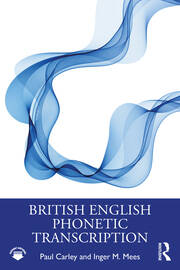British English Phonetic Transcription provides an accessible introduction to phonemic, phonetic and intonational transcription with a focus on British English. Featuring exercises, revision tasks and recordings to help students gain hands-on practice, the book takes a learning-by-doing approach and ensures students gain practice using each new symbol or concept introduced before moving on to the next. Consisting of three parts, the book covers:
- transcribing individual words, including consonants, vowels, primary stress, secondary stress, syllabic consonants and inflections;
- transcribing phrases and sentences, including liaison, weak forms, elision and assimilation;
- transcribing intonation, including the structure of English intonation and recognising pitch patterns.
Ideally suited as a standalone workbook or for use alongside American English Phonetic Transcription, British English Phonetic Transcription is key reading for undergraduate students of linguistics as well as anyone teaching or learning English as a foreign language.
Symbols for phonemic transcription
Phonetic symbols and diacritics
The International Phonetic Alphabet
Preface and acknowledgements
Before you start transcribing…
PART A: TRANSCRIBING WORDS
1. The familiar consonants /p b t d k ɡ f v s z h m n w l r/ and the vowels /ɪ æ e ɒ ʌ ʊ/
2. Primary stress, schwa /ə/ and unstressed KIT /ɪ/
3. Consonants with unfamiliar symbols: /ʃ ʒ ʧ ʤ j ŋ θ ð/
4. The FLEECE /iː/ and GOOSE /uː/ vowels
5. The PALM /ɑː/, THOUGHT /ɔː/, NURSE /ɜː/ and SQUARE /ɛː/ vowels
6. The FACE /eɪ/, PRICE /aɪ/ and CHOICE /ɔɪ/ vowels
7. The GOAT /əʊ/ and MOUTH /aʊ/ vowels
8. The NEAR /ɪə/ and CURE /ʊə/ vowels
9. Syllabic consonants
10. Secondary stress
11. Inflections and epenthesis
PART B: TRANSCRIBING CONNECTED SPEECH
12. Connected speech and liaison
13. Stress and weak forms
14. Elision
15. Assimilation
16. Connected speech: extended practice
PART C: TRANSCRIBING INTONATION
17. An introduction to intonation
18. Nucleus and tail
19. Head and pre-head
20. Intonation: Extended practice
APPENDICES
A. Summary of consonant and vowel theory
B. Phonetic transcription
References and suggested reading
Index
Biography
Paul Carley has held posts at the University of Applied Sciences, Utrecht, the universities of Bedfordshire and Leicester, UK, and the Fakeeh College for Medical Sciences, Jeddah. He is a regular lecturer on the UCL Summer Course in English Phonetics and examiner for the International Phonetic Association.
Inger M. Mees is Associate Professor Emeritus at the Copenhagen Business School and a part-time lecturer in the Department of English, Germanic and Romance Studies, Copenhagen University. She has formerly held lectureships at the universities of Leiden and Copenhagen. She is on the academic staff of the UCL Summer Course in English Phonetics.
"Clear, concise, and comprehensive. An ideal way to develop a confident command of this essential branch of phonetics."
David Crystal, Honorary Professor of Linguistics at the University of Bangor, UK
"Dealing first with the consonant symbols already familiar to us from our traditional alphabet, then the additional consonant symbols required and those used for representing English vowels, this beautifully clear transcription course, written by two internationally acclaimed experts, provides abundant, carefully prepared practice material for committing sounds to paper. Guiding the user not only through the phonemic representation of single words and connected speech, but also including more detailed transcription for the more advanced learner, together with exercises for marking up intonation, this is a fully up-to-date treatment of British English pronunciation, including detailed comparisons with American English and, not least, an appendix on articulation."
Brian Mott, University of Barcelona, Spain
"Having leafed through this book you ask yourself how you managed to survive all these years without it, because you no longer have to design your own exercises or scrape them together from other sources. This book will develop, improve and consolidate transcription skills; this makes it a must-have book."
Petr Rösel, University of Mainz, Germany
"Mees and Carley draw on their considerable experience and expertise in teaching and learning English phonetic transcription to produce a step-by-step, clearly written text with a wealth of audio-supported practice activities which will be invaluable to students of English phonetics and linguistics. I predict this will become an essential resource."
Jane Setter, University of Reading, UK




